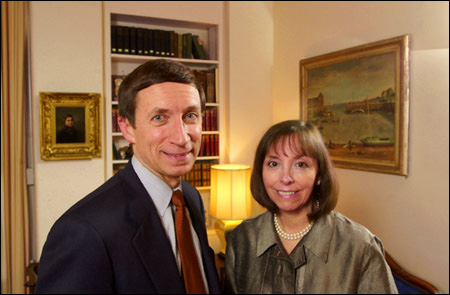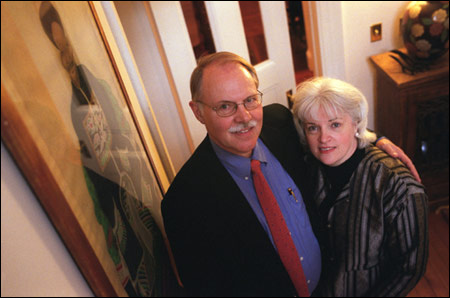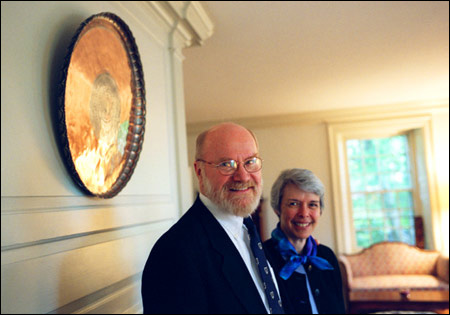Mastering the art of making a house a home:
Three pairs of house masters will be moving on this year, but will not soon be forgotten

At Harvard College, no one has to live on campus after freshman year, yet an astonishing 97 percent of students continue to do so until graduation – and whether they know it or not, they have their house masters to thank.
“House masters are critical to the health of the college, and to the experience of the students,” says Dean Harry Lewis. “Every year, they manage to knit a wonderful community out of people with very different backgrounds and interests.”
The fabric of that community is being rewoven with the departure of the masters of Cabot House, Winthrop House, and Currier House. All three couples, who get no teaching relief while serving as masters, are leaving because of increasing job responsibilities and to pursue other interests. And all three have seen a rejuvenation of the house system under Dean Lewis’ stewardship of the past eight years, with better integration of the quad houses into campus life, more senior dual-career couples becoming masters, and more families with young children taking the position.
James H. Ware, dean for academic affairs at the School of Public Health, and Janice Ware, associate director of the Developmental Medicine Center at Children’s Hospital, have been at Cabot House for seven years. They took the position, says Janice, partly because they thought it would be “a great experience for our own family to live in such an interesting and enriching environment.” But they soon found themselves moved by their new “family” as well. “You have a very intense relationship with the students while they’re at Harvard,” says Jim, “and then they go on to the next stage in their lives. Many of our resident tutors are Cabot grads, so there’s a nice continuity, but there’s a sense of emotional responsibility that does make it a bit like being a parent.”
The Wares have particularly enjoyed attending the intramural sports for which Cabot House is so well-known – including this year’s reclaiming of the Straus Cup. “They’re so enthusiastic about the program,” says Susannah Graves ’03, “always happy to help out in any way they can. They’re really interested in house spirit.” Janice underscores Graves’ assessment when she notes that though grace on the playing field is nice, “the emphasis for the students is not on athletic supercompetence. It’s really about getting involved.”

Getting involved is just what the Wares have done so well – not just with athletics, but by lending an ear when students come to them with social issues, by offering career advice, by selecting good tutors and motivating them to be “really invested,” as Jim put it, and simply by opening their door to students who chose to enter it. But now, they say, it’s time to turn over the fort. “Given how busy our schedules have become,” says Janice, “we thought it was time for someone new to step in with new energy and ideas.”
“Our seven years have been a great run,” Jim adds. “A really wonderful adventure.”
According to Marc Manara ’04, Currier House Masters William A. Graham, Ph.D. ’73, and Barbara Graham, Ed.D. ’89, “make house life very comfortable. I love the Grahams. They’re very personable, very easy to get along with, and very enthusiastic about living with students – which I imagine is not an easy thing to do.”
The Grahams might beg to differ, even after 12 years of residence at Currier House. “It’s a terribly exciting time in students’ lives,” says Bill, the Murray A. Albertson Professor of Middle Eastern Studies and dean of the Divinity School, “and therefore it’s also exciting to work with them. You meet students of such widely varying interests and talents all the time that there’s never a dull moment.”
Barbara, associate director for administration and programs in the Harvard University Library, agrees. “Being asked to be master is an honor,” she says. “Even though it entails committing a significant amount of one’s time, it’s an opportunity to come to know some of the country’s best and most intelligent young people. It’s hard not to leave the mastership with greater optimism about the future for having been exposed to this extraordinarily talented and service-minded group of young people.”
The pair believe strongly, as Barbara put it, that “a master is meant to enhance the intellectual, academic, and cultural life of the house, and to engender community while respecting differences.” They see the house as a dynamic environment that extends the classroom experience into a less formal setting, where discussions are constantly being held on a variety of topics. One key to the success of house masters is selecting, training, and sustaining an outstanding and diverse tutorial staff; all three couples believe their house tutors have made a huge difference both intellectually and socially.
Both of the Grahams mentioned the musical talent that’s rampant at Currier House – Bill described it as “quite stunning” – and also emphasized that interacting with students is a two-way street. Barbara pointed out that the cultural and intellectual life of the house – concerts and other artistic endeavors as well as the numerous seminars and lectures delivered in the senior common room – was “an invaluable experience that really enhanced our family life.”
Though they’re looking forward to the future, the Grahams will clearly miss house life. “It’s obviously hard,” Bill says, “to leave something that you’ve really loved, and in which you’ve invested 12 years as a family.”

The outgoing house masters with the longest tenure in the position – having spent six years at Dudley House before moving on to Winthrop House, where they have been for nine years – are Paul Hanson, Ph.D., and Cynthia Rosenberger, Ed.D. The pair echoed both the Wares and the Grahams when discussing house life.
“It’s been a wonderful opportunity to have rich relations with the students,” says Rosenberger, who teaches early childhood and elementary education at the University of Massachusetts, Amherst, and holds workshops for Winthrop House students interested in teaching as a career. In addition to the artistic and musical and athletic events, the Hanson-Rosenbergers will miss being available for students seeking advice, particularly about their careers. “Some very searching conversations take place,” Hanson says, “because the period we work with these students is probably the most formidable in terms of making long-range decisions that will have bearing on the rest of their lives. I don’t think Harvard students realize often enough that they can be audacious about what they plan for the future.”
As to Hanson’s own future, the Florence Corliss Lamont Professor of Divinity will be on sabbatical next year as a Henry Luce fellow at Princeton, working to complete a book project. He notes wistfully that “as I look at the facebook here on my desk as it always is, I’m just really going to miss these students,” adding that “another blessing of the job has been the camaraderie and esprit de corps we’ve experienced with the staff, from tutors to dining hall and housekeeping staff, to our marvelous superintendent and night watchman.”
But he also mentions that “it entered my mind recently [that] I think I’m going to have room for some extra reading next fall when I don’t have 400 new names to learn. Everything in its time. We’re looking forward to new experiences, with no regrets.”
“We feel really blessed to have had this unique opportunity,” Rosenberger adds.
Clearly, the Hanson-Rosenbergers will be missed. Shawn Snyder ’03 recalled moving into Winthrop House a year late, having transferred from Mather House. “But coming into this new environment I felt immediately welcome,” he says. “A lot of that’s because of Paul and Cynthia. They’ve turned a college dorm into a really warm, welcoming, wonderful home.”
It seems all those who know these house masters would agree that they have had a huge impact not just on the students they’ve touched, but on the college as a whole.
“These three couples have been spectacular,” says Tom Dingman, associate dean of Harvard College. “They’ve been devoted to their students, they have worked hard to assemble a strong tutorial core, and they’ve been real citizens of the college. We’ve been lucky they’ve been willing to serve as long as they have, and they’re all going to leave big shoes to fill.”




